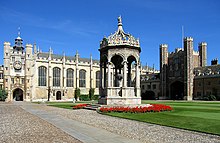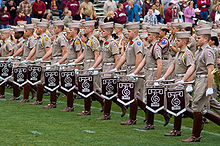This is an essay on the neutral point of view policy. It contains the advice or opinions of one or more Wikipedia contributors. This page is not an encyclopedia article, nor is it one of Wikipedia's policies or guidelines, as it has not been thoroughly vetted by the community. Some essays represent widespread norms; others only represent minority viewpoints. |
| This page in a nutshell: Do not praise an academic institution; describe it using neutral language and verifiable facts. |





Wikipedia articles on colleges, universities, and other academic institutions are often written by editors who currently or previously attended the institution or who work for the institution. Editors are often motivated by conflict of interest, loyalty, and pride to portray their alma mater in a favorable light even though this often conflicts Wikipedia's core policy against the abuse of Wikipedia for promotion as well as the content policies on neutrality and verifiability. Using imprecise weasel words, non-neutral peacock words, and other 'words to avoid' to portray an academic institution in a positive light is termed boosterism. A reader might be forgiven for concluding that Wikipedia only covers colleges and universities in the fictional town of Lake Wobegon, where all colleges and universities are above average.
Just as there is no single, indisputably preeminent college or university, there is no single metric which definitively establishes the quality of a college or university. Every institution is different and its Wikipedia article should emphasize these differences by summarizing what an academic institution has and does rather than serving as a shrine to its various accolades and superlatives. Notable distinctions and recognition have their place in the article, but they should not be the primary focus of the article. Wikipedia is an encyclopedia to summarize and contextualize information about these complex institutions, not an admissions brochure to convince readers of the quality of the school. Allow the facts to speak for themselves and let the reader decide.